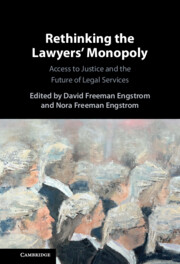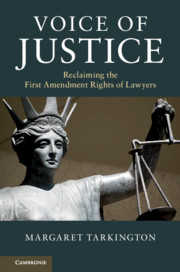Rethinking the Lawyers' Monopoly
For decades, American lawyers have enjoyed a monopoly over legal services, built upon strict unauthorized practice of law rules and prohibitions on nonlawyer ownership of law firms. Now, though, this monopoly is under threat-challenged by the one-two punch of new AI-driven technologies and a staggering access-to-justice crisis, which sees most Americans priced out of the market for legal services. At this pivotal moment, this volume brings together leading legal scholars and practitioners to propose new conceptual frameworks for reform, drawing lessons from other professions, industries, and places, both within the United States and across the world. With critical insights and thoughtful assessments, Rethinking the Lawyers' Monopoly seeks to help shape and steer the coming revolution in the legal services marketplace. This title is also available as open access on Cambridge Core.
- Outlines interdisciplinary approaches to address current deficiencies in the market for legal services
- Brings together leading legal scholars and practitioners to propose conceptual frameworks for how to reform the US legal services marketplace, drawing lessons from other professions, industries, and places, both within the United States and around the world
- Available as Gold Open Access on Cambridge Core.
Product details
June 2025Adobe eBook Reader
9781009528528
0 pages
Not yet published - available from June 2025
Table of Contents
- Introduction: envisioning the future of legal services David Freeman Engstrom and Nora Freeman Engstrom
- Part I. Framing the Issue: Conceptualizing the Challenge of Access to Justice and Legal Services Regulation:
- 1. Justice futures: access to justice and the future of justice work Rebecca L. Sandefur and Matthew Burnett
- 2. Race and the political economy of civil justice Brian Libgober
- 3. The hypocrisy of attorney licensing Rebecca Haw Allensworth
- 4. The case for the traditionalists W. Bradley Wendel
- Part II. Lessons from the Field: On-the-Ground Efforts to Effect Positive Change:
- 5. What can legal services reformers learn from court efforts to assist self-represented litigants Judge Carolyn B. Kuhl
- 6. Civil [justice] engineering: leveraging the tools of community, research, and fiscal impact to build bridges to justice Neil Steinkamp and Samantha DiDomenico
- 7. Beyond access to justice: power, organizing, and civil legal inequality Jamila Michener
- 8. The puzzle of anemic 'legal tech' and the future of legal services David Freeman Engstrom and Jess X. Lu
- Part III. The Comparative Lens: What Can Be Learned from Others?:
- 9. How power undermined the medical profession Allison K. Hoffman
- 10. Lessons from medicine's experiment with nurse practitioners and physician assistants Philip G. Peters
- 11. The statutory influence of tribal lay advocates Lauren van Schilfgaarde
- 12. Necessary but insufficient? Reforms to legal services regulation, technology and the role of the courts in increasing access to justice in England and Wales Natalie Byrom
- 13. Legal tech companies and access to justice in Germany Giesela Rühl
- Part IV. New Frontiers: Charting the Future of Legal Services:
- 14. Professional speech, the lochnerized first amendment, and the unauthorized practice of law Genevieve Lakier
- 15. Rethinking 'our bar federalism' David Freeman Engstrom and Daniel B. Rodriguez
- 16. Access to advice as a linchpin of family justice Rebecca Aviel
- 17. Putting railroad justice back on track Samuel Issacharoff and Beverly B. Martin.



